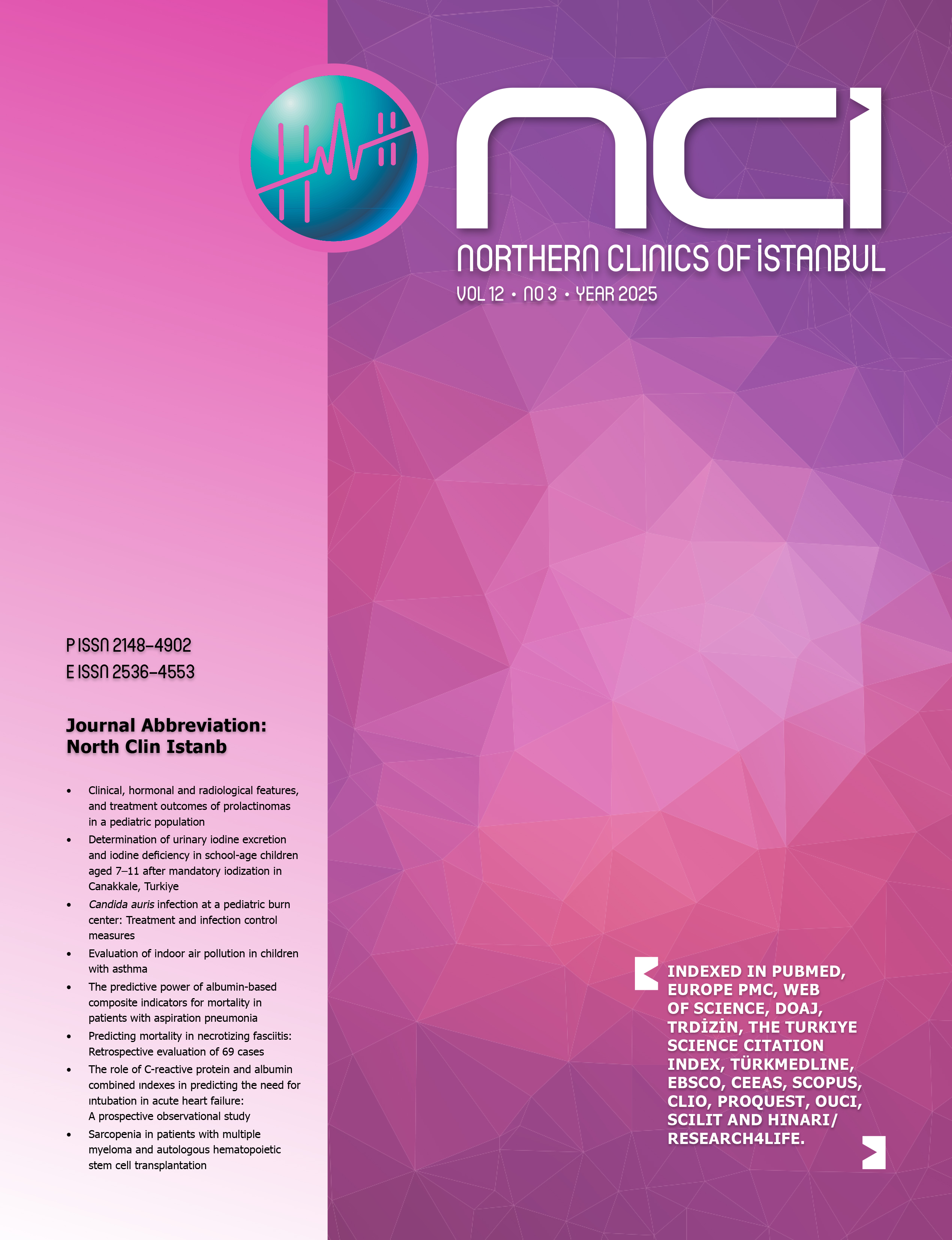Investigation of the effects of MTHFR gene variations and homocysteine levels in hypertensive patients
Sibel Kuras1, Mahmud Esad Pence2, Esref Arac3, Ahmet Yildiz4, Bekir Erdogan5, Sadrettin Pence61Department of Medical Biochemistry, University of Health Sciences, Hamidiye Faculty of Medicine, Istanbul, Turkiye2Department of Medical Biochemistry, Istanbul Medipol University Faculty of Medicine, Istanbul, Turkiye
3Department of Internal Medicine, Dicle University Faculty of Medicine, Diyarbakir, Turkiye
4Department of Cardiology, Istanbul University Faculty of Medicine, Istanbul, Turkiye
5Department of Physiology, University of Health Sciences, Hamidiye Faculty of Medicine, Istanbul, Turkiye
6Department of Physiology, Istanbul Medeniyet University Faculty of Medicine, Istanbul, Turkiye
OBJECTIVE: To investigate the effects of methylenetetrahydrofolate reductase (MTHFR) gene C677T/A1298C polymorphisms on serum homocysteine levels and hypertension.
METHODS: Venous blood samples were collected in EDTA tubes from patients and controls (80 hypertensive patients and 67 healthy controls) and genomic DNA was isolated. The polymorphisms of MTHFR C677T and A1298C were identified using the polymerase chain reaction (PCR) and restriction fragment length polymorphisms (RFLP) technique. The enzyme-linked immunosorbent assay (ELISA) method was used to determine serum homocysteine levels. ANOVA, Students t-test, chi-square test and logistic regression analysis tests used in the evaluation of statistical analysis between patient and control groups
were performed with SPSS 21.0 program.
RESULTS: A statistically significant difference was observed between the patient group, which were hypertension-diagnosed patients, and control group for C677T polymorphism (p<0.001), but not for the A1298C polymorphism (p=0.058). When serum homocysteine levels were compared between the patient and control groups, no significant difference was observed (p=0.065). A significant difference was observed between C677T allele frequency (TT + CT versus CC) and homocysteine levels in both groups (p=0.027), whereas no significant difference was observed between A1298C allele frequency (CC + AC versus AA) and homocysteine levels (p=0.996).
CONCLUSION: The MTHFR C677T polymorphism is more common in hypertensive patients. T allele frequencies (CT and TT genotypes) and TT genotypes might increase the risk of hypertension and homocysteine levels. Although the A1298C C allele frequency (AC and CC genotypes) might increase the risk of hypertension, CC genotype distributions and homocysteine levels show no statistical significance on hypertension. C677T polymorphism is associated with hypertension thus it may be used as a potential biomarker.
Hipertansiyon hastalarında MTHFR gen varyasyonları ve homosistein düzeylerinin incelenmesi
Sibel Kuras1, Mahmud Esad Pence2, Esref Arac3, Ahmet Yildiz4, Bekir Erdogan5, Sadrettin Pence61Sağlık Bilimleri Üniversitesi, Hamidiye Tıp Fakültesi, Tıbbi Biyokimya Anabilim Dalı, İstanbul2İstanbul Medipol Üniversitesi Tıp Fakültesi, Tıbbi Biyokimya Anabilim Dalı, İstanbul
3Dicle Üniversitesi Tıp Fakültesi, İç Hastalıkları Anabilim Dalı, Diyarbakır
4İstanbul Üniversitesi Tıp Fakültesi, Kardiyoloji Anabilim Dalı, İstanbul
5Sağlık Bilimleri Üniversitesi, Hamidiye Tıp Fakültesi, Fizyoloji Anabilim Dalı, İstanbul
6İstanbul Medeniyet Üniversitesi Tıp Fakültesi, Fizyoloji Anabilim Dalı, İstanbul
Amaç: Çalışmamızda metilen tetrahidrofolat redüktaz (MTHFR) geni C677T/A1298C polimorfizmlerinin serum homosistein düzeylerine ve hipertansiyon üzerine etkilerini incelemeyi amaçladık.
Metod: Hasta ve kontrol grubunu oluşturan bireylerden (80 hipertansiyon hastası ve 67 sağlıklı kontrol) EDTAlı tüplere venöz kan örnekleri alındı ve genomik DNA izole edildi. MTHFR C677T ve A1298C polimorfizmlerinin saptanması için polimeraz zincir reaksiyonu (PCR) ile restriksiyon fragman uzunluk polimorfizmi (RFLP) yöntemi kullanıldı. Serum homosistein düzeylerinin belirlenmesi için enzim bağlı immunosorbent tayini (ELİSA) yötemi kullanılmıştır. Hasta ve kontrol grupları arasındaki istatistiksel analiz değerlendirilmesinde kullanılan ANOVA, Students t testi, ki-kare testi ve lojistik regresyon analizi testleri SPSS 21.0 programı ile yapıldı.
Bulgular: MTHFR C677T polimorfizmi hasta ve kontrol grupları arasında karşılaştırıldığında istatistiksel bir anlamlılık gözlenirken (p<0.001), MTHFR A1298C polimorfizminde bir anlamlılık gözlenmemiştir (p=0.058). Gruplar arası serum homosistein seviyeleri karşılaştırıldığında anlamlı bir farklılık görülmemiştir (p=0.065). Her iki grupta C677T allel frekansı ile homosistein düzeyleri değerlendirildiğinde ise anlamlı farklılık görülürken (p=0.027), A1298C allel frekansı ve homosistein düzeyleri arasında anlamlı farklılık görülmemiştir (p=0.996).
Sonuç: MTHFR C677T polimorfizmi hipertansif hastalarda daha yaygındır (Reviewer 2). T alel frekansı (CT ve TT genotipleri) ve TT genotipleri hipertansiyon riskini ve homosistein düzeylerini artırabilir. MTHFR A1298C C alelle frekansı (AC ve CC genotipleri) hipertansiyon riskini artırabilmesine rağmen, CC genotip dağılımları ve homosistein düzeyleri hipertansiyon üzerinde istatistiksel olarak anlamlı değildir. C677T polimorfizmi hipertansiyon ile ilişkilidir ve bu nedenle potansiyel bir biyobelirteç olarak kullanılabilir. (NCI-2023-9-3)
Manuscript Language: English





















